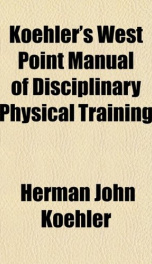koehlers west point manual of disciplinary physical training

Purchase of this book includes free trial access to www.million-books.com where you can read more than a million books for free. This is an OCR edition with typos. Excerpt from book: In these commands the executive word must also indicate how what is required is to be performed. In the first of these exercises the word RISE is spoken sharply and quickly, indicating snap and quick action; the word BEND is drawn moderately, indicating moderately slow performance; the word EXTEND is given in the same way, while the word DOWN is spoken moderately fast and definitely, indicating moderately fast performance and finality. In the second exercise the word BEND is drawn considerably, indicating slow performance, while the word RECOVER is spoken moderately fast and sharp. The word RECOVER is generally used to bring the men back to the original starting position. 97. Commands for Continued Performance. In these the preparatory commands must explain the entire exercise, while the command of execution, which is almost always confined to the word EXERCISE, calls for the continuation of the exercise, the commands fitting the repetitions being confined to numerals. 98. When large bodies of men are exercising together it is advisable to follow up the explanatory preparatory command with another preparatory command that will prepare the men for the command of execution. This will insure the exercise being performed simultaneously. Thus: i. Swing arms downward and sideward, 2. In cadence, 3. EXERCISE. 99. To discontinue an exercise performed in this manner, the command HALT is given in place ofthe last numeral, which, in order to prepare the men for the command halt, should always be given with a rising reflection. Thus: i. Thrust arms forward, 2. EXERCISE. One, two, one, two, one, HALT. 100. When numerals are used they should always be equal to the number of movements composing the exercise. Thus, an exercise of two movements will be repeated at one, two;...
Info about the book
Author:
Series:
Unknown
ASIN:
B002YX0AOM
Rating:
4.5/5 (4)Your rating:
0/5
Languge:
English
Users who have this book
Users who want this book
What readers are saying
What do you think? Write your own comment on this book!
write a commentGenre
if you like koehlers west point manual of disciplinary physical training try:
Other books by this author
Do you want to exchange books? It’s EASY!
Get registered and find other users who want to give their favourite books to good hands!


